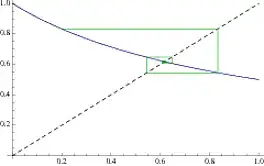We define
$$a_{n+1}=\frac{1}{1+a_n}, a_0=c> 0$$
I stumbled across that sequence and Mathematica gives me that it converges against $\frac{1}{2} \left(\sqrt{5}-1\right)$ which doesn't even depend on $a_0$. Normally I show that sequences converge by seeing that they are monotonic and then the limit can be easily found by setting $a_n=a_{n+1}$, but this one seems to be alternating. Also by checking OEIS I noticed that $a_n=1/g(n)$ where $g(n)$ gives the $n+1$'th Golden Rectangle Number.
I would be glad if someone can show me how to show that such sequences converge and how to find the limit, also maybe this is a well known sequence, as it has a quite simple form, too bad that google is very bad for looking for sequences and OEIS doesn't mention anything.

For instance, consider
$a_0 = \frac{c}{10}$ where $c \in [0,10]$
$a_{n+1} = \frac{9+a_n}{10}$
Note that $\displaystyle \lim_{n\rightarrow \infty} a_n = 1$ for any starting value $c \in [0,10]$
– May 12 '11 at 18:50